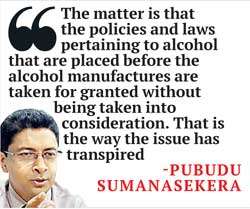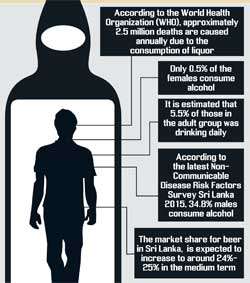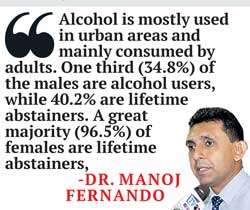Reply To:
Name - Reply Comment
Last Updated : 2024-05-11 03:39:00
 Beer, wine, liquor, and whiskey carry the label alcohol. In some countries, consuming alcohol is illegal. In others, it is a widespread practice. The consumption of alcohol carries a risk of adverse health and social consequences related to its intoxicating, toxic and dependence-producing properties.
Beer, wine, liquor, and whiskey carry the label alcohol. In some countries, consuming alcohol is illegal. In others, it is a widespread practice. The consumption of alcohol carries a risk of adverse health and social consequences related to its intoxicating, toxic and dependence-producing properties.
According to the World Health Organization (WHO), approximately 2.5 million deaths are caused annually due to the consumption of liquor. That number is equivalent to nearly 4% of global fatalities. Besides, alcohol is associated with more than 200 diseases and conditions and is a major risk factor for Non-Communicable Diseases.
According to the latest Non-Communicable Disease Risk Factors Survey Sri Lanka 2015, 34.8% males consume alcohol. 42.3% of those who consume alcohol fall into the age category of 30-44 years while 42.7% of the males who consume alcohol fall into the age category of 45-59.
Only 0.5% of the females consume alcohol. The great majority (93.9%) of the current male drinkers is estimated to be consuming low end level alcohol and only 3.5% is consuming high end level alcohol. It is estimated that 5.5% of those in the adult group were drinking daily and this group comprised only males. More than two thirds (69.9%) of the group was estimated to drink 1 to 3 days a month or less.
Alcohol invades the island
Alcohol has become abundantly available in Sri Lanka over the past three decades with the liberalization of trade and open economy policies adopted since 1977. This has led to some sections of the population being open to greater risk of alcohol-related harm. These include the low income, unemployed, or partially employed rural and urban  working population who are mainly addicted to consuming of illicit alcohol.
working population who are mainly addicted to consuming of illicit alcohol.
Speaking with the , Senior Lecturer in Health Promotion at Rajarata University of Sri Lanka, Dr. Manoj Fernando said alcohol consumption in Sri Lanka is on the rise. He said that Sri Lanka is consequently the second highest alcohol consuming country among South Asian countries.
“Alcohol is mostly used in urban areas and mainly consumed by adults. One third (34.8%) of the males are alcohol users, while 40.2% are lifetime abstainers. A great majority (96.5%) of females are lifetime abstainers,” Dr. Fernando said.
He stressed that the Government’s decision to reduce the tax on beer by 40% and

simplify the issuance and rate structure of liquor retail licenses, would further increase beer consumption by 22.5% within next two years and eventually the total alcohol consumption would also increase.
Therefore he suggested that multiple approaches need to be taken by the authorities in order to control the alcohol consumption and overcome this liquor menace. He added that the Government should aim more at discouraging the production of liquor than trying to reduce the consumption of alcohol.
The global average for alcohol consumption is approximately 6.2 liters per person per year. Belarus has the highest level of alcohol consumption in the world, with an average of 17.5 liters of pure alcohol consumed per capita annually.
One of the factors that seems to contribute to a higher than average level of alcohol consumption is the absence of public health campaigns that educate people about the negative consequences of consuming alcohol. Other factors include depressed economies, high poverty rates and cultural attitudes.
Why production of alcohol should be controlled
Speaking with the , Alcohol and Drug Information Center (ADIC) CEO Pubudu Sumanasekera highlighted that Sri Lanka’s alcohol industry was trying to manipulate the Government policies on alcohol and adjust them according to their wishes.
 “The matter is that the policies and laws pertaining to alcohol that are placed before the alcohol manufactures are taken for granted without being taken into consideration. That is the way the issue has transpired. If the Government controls the production and the distribution of alcohol in an efficient manner, the issue of consumption of liquor can be addressed with ease,” Sumanasekera opined.
“The matter is that the policies and laws pertaining to alcohol that are placed before the alcohol manufactures are taken for granted without being taken into consideration. That is the way the issue has transpired. If the Government controls the production and the distribution of alcohol in an efficient manner, the issue of consumption of liquor can be addressed with ease,” Sumanasekera opined.
“As we have observed, the alcohol industry of Sri Lanka is trying to take over the controlling of policies by the Government instead of carrying them out. If this continues, protecting Sri Lanka from this alcohol hazard will remain a dream,” he added.
He suggested that the alcohol industry should work in collaboration with the Government in view of finding better solutions to end the excessive consumption of alcohol in Sri Lanka.
How about the tax reduction on beer
The 2018 Budget reduced excise taxes on strong beer by 40% and raised taxes on hard liquor by 2%. The Budget also introduced a nation building tax of 2% on all alcoholic beverage sales with effect from April this year. Different people comment differently on the decision taken by the Government. Some seem to be positive whereas others seem to be negative. Thus, it is essential to talk on this topic using different perspectives.
the decision taken by the Government. Some seem to be positive whereas others seem to be negative. Thus, it is essential to talk on this topic using different perspectives.
With the latest tax revisions, barring further changes, the market share for beer in Sri Lanka, as calculated by Fitch, is expected to increase by 24%-25% in the medium term, posting an average volume growth of 22% over 2017-2019.
Sumanasekera said that the proposals of the Budget 2018 to decrease the tax on beer by 40% and to issue licenses to sell alcohol with a new strategy, would bring tragedy to the country.
He said that although the reduction of tax on beer was done in view of promoting the tourism industry and discouraging the consumption of moonshine (Kasippu), it would not in anyway contribute to the efforts in attracting foreigners nor reducing the consumption of moonshine.
“The introduction of a new flexible procedure to issue license would provide more room for anyone to start a liquor shop and consequently the consumption of alcohol would rapidly rise in Sri Lanka. We cannot fathom as to why the Finance Minister has made such proposals to which the consent wasn’t received from both President and the Minister of Health,” said Sumanasekera.
He further said that the system of monopoly in the tobacco industry in Sri Lanka might change with permission given to new tobacco companies to import liquor from abroad with the easy access of possessing licenses.
Meanwhile Dr. Fernando criticized the Government’s decision to revise the opening hours of all liquor stores. Although President Sirisena abolished the gazette notification pertaining to the opening hours of all liquor stores, the decision itself by the Ministry of Finance was stupid.
Overcoming this menace
The current alcohol use among males has increased in comparison to the prevalence observed in 2008 (34.8% in 2015 and 26.0% in 2008).This is an alarming issue and it is necessary to voice the need to evaluate the current strategies and policies in view of  implementing an accelerated programme.
implementing an accelerated programme.
It is estimated that 16.8% of males adults had indulged in binge drinking (six or more drinks on a single occasion and at least once during a month) compared to only 0.1 % of the females who binge drink. This underscores the need to adapt the current programmes to address these critical issues.
National Authority on Tobacco and Alcohol (NATA) Chairman Dr. Palitha Abeykoon told the that the per capita consumption of liquor in Sri Lanka is 3.5 litres per year and added that it is comparatively higher than other countries.
“It is appropriate to decrease or discourage the supply of alcohol by imposing higher taxes on the production of alcohol related beverages. On the other hand, the general public should be educated with regard to the consequences of consuming alcohol.
The awareness programmes should be commenced from school level and should continue from village to village. Special attention should be paid to prevent the youth and needy people from getting addicted to alcohol.
“In conclusion, it is vital to realize the fact that the consumption of alcohol only drags us to the end of life and exposes us to harmful consequences. At the same time, the consumption of alcohol not only deteriorates your life, but also causes trouble to teetotalers. For example when a father returns home drunk daily and shouts at the members of the family, it would cause mental stress and irritation to the others. Likewise, those who don’t consume alcohol would suffer at the hands of alcohol users. Therefore Sri Lankans should rethink of the use of alcohol and its repercussions and create an anti-alcohol society in Sri Lanka.

Add comment
Comments will be edited (grammar, spelling and slang) and authorized at the discretion of Daily Mirror online. The website also has the right not to publish selected comments.
Reply To:
Name - Reply Comment
US authorities are currently reviewing the manifest of every cargo aboard MV
On March 26, a couple arriving from Thailand was arrested with 88 live animal
According to villagers from Naula-Moragolla out of 105 families 80 can afford
Is the situation in Sri Lanka so grim that locals harbour hope that they coul